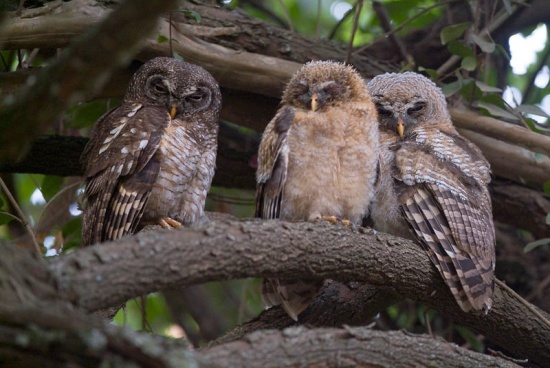- Strix woodfordii
Identification
30–35 cm (11¾-13¾ in)
- Brown upperparts with white spots
- Whitish underparts with reddish and dark barring
- Brown facial disk with white eyebrows
- Dark eyes
- No ear tufts.
Distribution
Widespread throughout sub-Saharan Africa, found in:
Western Africa: Senegambia, Senegal, The Gambia, Guinea-Bissau, Guinea, Sierra Leone, Liberia, Ivory Coast, Ghana, Togo, Benin, Nigeria, Cameroon, Central African Republic, Equatorial Guinea, Gabon, Congo, Angola
Eastern Africa: Sudan, Ethiopia, Somalia, Kenya, Uganda, Rwanda, Burundi, Tanzania, Zanzibar, Zambia, Mozambique, Malawi
Southern Africa: Namibia, Botswana, Zimbabwe, South Africa, KwaZulu-Natal, eSwatini
African Islands: Gulf of Guinea Islands, Bioko (Fernando Po)
Taxonomy
There are four subspecies;
Subspecies
There are 4 subspecies[1]:
- S. w. nuchalis:
- S. w. umbrina:
- S. w. nigricantior:
- S. w. woodfordii:
- Southern Angola to southern Zaire, Botswana, south-western Tanzania and South Africa
Habitat
Forest and woodland; also plantations.
Behaviour
Diet
The diet includes insects, reptiles, small mammals and birds.
Breeding
They nest in a tree cavity. 1-3 eggs are laid and incubated for about 31 days. The young fledge at 5 weeks of age and can fly by 7 weeks. The young remain with parents up to 4 months and sometimes stay until the next breeding season.
References
- Clements, J. F., T. S. Schulenberg, M. J. Iliff, D. Roberson, T. A. Fredericks, B. L. Sullivan, and C. L. Wood. 2017. The eBird/Clements checklist of birds of the world: v2017, with updates to August 2017. Downloaded from http://www.birds.cornell.edu/clementschecklist/download/
- Avibase
- World Owl Trust
- Handbook of the Birds of the World Alive (retrieved July 2018)
Recommended Citation
- BirdForum Opus contributors. (2024) African Wood Owl. In: BirdForum, the forum for wild birds and birding. Retrieved 16 April 2024 from https://www.birdforum.net/opus/African_Wood_Owl
External Links
GSearch checked for 2020 platform.1




